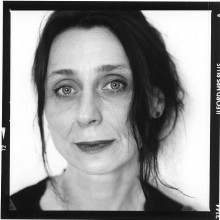Polish literature

Natasza Goerke
Born in Poznań in 1962, Goerke writes fiction and poetry. She studied Polish literature at Adam Mickiewicz University in Poznań and Oriental studies at Jagiellonian University in Kraków. In the mid-1980s she emigrated to Germany, where she studied Tibetan languages and Eastern religions in depth. In 2003, she was nominated for the NIKE prize. She currently lives in Hamburg.
The terms “grotesque” and “surreal” are often used to describe Goerke’s work, both in some ways aptly, though above all it is philosophical prose, with its roots in the Enlightenment tradition of the story, dressed up in modern costume. Goerke’s works – usually concise and very concentrated – present an artificial, caricature of reality, which, owing to one or another of its excesses and shortcomings, is unable to function as it should, and thus “goes off”, making life impossible for the heroes (who are treated with a mixture of sarcasm and concern) and preventing the action from developing as well. In this way the crisis of the novel gains its metaphysical justification.
On the other hand, Goerke’s world has slowly taken on coherence, thanks to her gradual absorption of Buddhist philosophy, resulting in her recently published novella, 47 With Full Force, her most wide-ranging work to date. In it, she does not abandon her caustic, disapproving view of European civilisation – the hero is a man to whom a monument is erected for having achieved and deserved nothing in life (only this sort of monument can possibly remain in today’s contradictory world). The prose is written in colloquial language, which is used to help express some imperceptibly vital truths; it takes some generally accepted notions to absurdity, and brings some “myths” (such as the aura surrounding leading Polish mountaineer Wanda Rutkiewicz) down to earth. It employs a refined sense of humour, as well as stylisation and parody (e.g. quotes from Miłosz and Blake acting as perfect examples of the scribblings of those who worship a hallucinogenic beetroot). In its often fairytale-like quality, it is rather like the short prose works of Robert Walser.
BIBLIOGRAPHY
- Fractale. Sklepy prześcieradłowe, Poznań: Obserwator, 1994.
- Księga pasztetów, Poznań: Obserwator, 1997.
- Pożegnania plazmy, Gładyszów: Czarne, 1999.
- 47 na odlew, Warszawa: Prószyński, 2002.
- Tam, Wołowiec: Czarne, 2017.
TRANSLATIONS
english:
- Farewell to Plasma, trans. W. Martin, Prague-New York: Twisted Spoon Press, 2000.
german:
- Sibirische Palme. Erzählungen, Hamburg: Rospo, 1997.
- Abschied vom Plasma, Hamburg: Rospo Verlag, 2000.
- Rasante Erstarrung, Innsbruck: Skarabaeus, 2003.
serbian:
- Sve paštete sveta [Księga pasztetów], Beograd: Plato, 2002.
slovak:
- Povedz mi čo si myslíš o Indii a ja ti poviem kto si, Bratislava: Drewo a Srd, 2002.